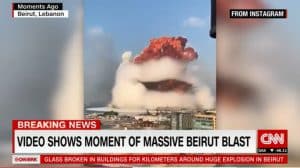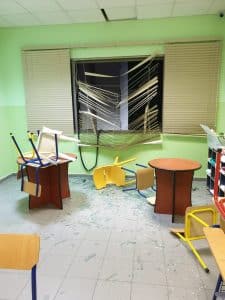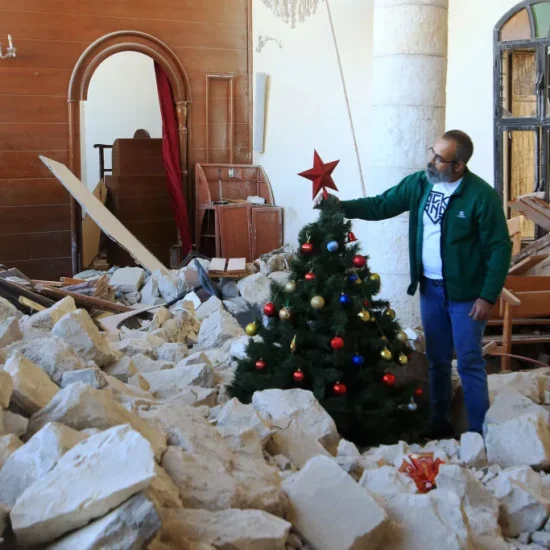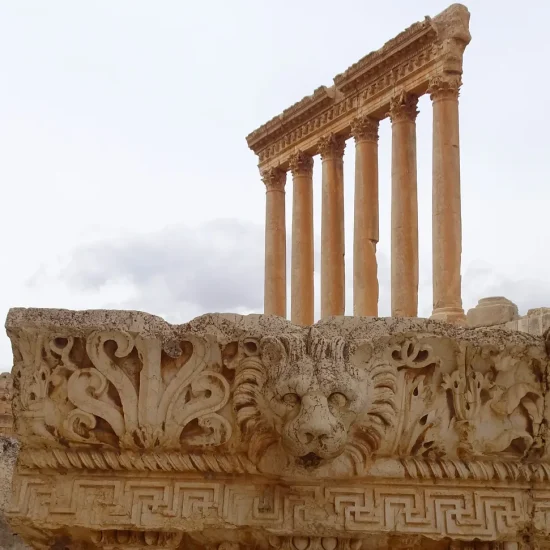
After a massive explosion rocked the Lebanese capital of Beirut Tuesday (August 4), Baptists in the country quickly requested prayers. The blast killed at least 73 people and injured more than 3,000 others.

Screengrab as CNN plays cellphone video of the August 4, 2020 explosion in Beirut, Lebanon.
Officials say a warehouse at the city’s port holding 2,750 tons of ammonium nitrate was the cause of the large explosion, though it wasn’t yet known what ignited it at just after 6 pm local time. (By comparison, the Oklahoma City bombing that killed 168 people involved two tons of ammonium nitrate.) Beirut’s governor, Marwan Abboud, said the impact reminded him of “Hiroshima and Nagasaki,” adding, “In my life I haven’t seen destruction on this scale.”
Nabil Costa, executive director of the Lebanese Society for Educational & Social Development (also known as the Lebanese Baptist Society), said in an email that the explosion “left an important part of the city laying in apocalyptic ruin.”
“Beirut looks like a war zone as the devastating shockwave shattered windows and vitrines sending debris and glass flying in all directions,” he added. “The rumble of the explosion was felt all the way to Cyprus” (a Mediterranean island 150 miles away).

Damage in the Beirut Baptist School. (LSESD)
Costa also noted that the hospitals cannot handle the “number of injured and maimed,” and that the losses will include many lives and “billions of dollars” of material damage. There was some damage to Beirut Baptist School (about two miles from the explosion) and the Gateway Bookshop (just over three miles from the explosion), both of which are owned by LSESD.
“This calamity could not have come at a worse time for a country on the brink of financial collapse and social implosion while the number of coronavirus cases have surged in recent days,” he said as he requested prayer for those who lost loved ones, are homeless, or are working to care for the injured.
Elie Haddad, president of Arab Baptist Theological Seminary in a Beirut suburb less than six miles from the explosion, told Word&Way that “Thankfully, the ABTS community is all safe.” ABTS is operated under the umbrella of the LSESD that Costa leads.
“This was the largest explosion that we have ever experienced in Lebanon,” Haddad added. “Prayers are welcomed.”
Lebanon experienced a civil war from 1975-1990 that included many bomb blasts and left up to 150,000 people dead. The new explosion not only initially raised concerns about terrorism, but could trigger traumatic memories for those who survived the war.
Like schools, churches, and businesses around the world, ABTS was already dealing with the impact of coronavirus, which forced the school to move its coursework online in the Spring and left some students stranded as they were unable to travel to their home countries for months.
And coronavirus isn’t the only crisis Lebanon has dealt with over the past year.
In October, protests erupted in Lebanon over a number of issues, including complaints about high unemployment, unstable currency, and the government’s failure to provide essential services like water and electricity. After two weeks of protests, the country’s prime minister offered his resignation, but remained in office until a successor was named in January.
Protests continued throughout that time, and economic woes worsened even after the political disruptions calmed down. Then coronavirus hit, which added to the economic woes.
Lina Sawan Raad, a vice president for the Baptist World Alliance, told Word&Way, the ongoing economic struggles and pandemic will magnify the difficulty of the moment.
“We as Lebanese people find ourselves in a prison with walls made of economic crisis, COVID outcomes, and explosion disaster,” she said. “The only way that can help us is prayers from the Earth to get rains of mercy from above. Each prayer is needed.”
The economic problems and coronavirus could add to the difficulty in recovering from the explosion. As of August 4, more than 5,000 people in Lebanon have tested positive for COVID-19 and 65 have died — but those numbers could grow as social distancing is more difficult during disaster relief crises.
According to the Baptist World Alliance, the Convention of Evangelical Baptist Churches in Lebanon has 32 churches with about 1,600 members. There are not yet reports of any Baptist congregations being directly impacted by the explosion, but a Mass being broadcast virtually due to coronavirus captured the impact of the blast as lights went out and debris fell on the priest.






